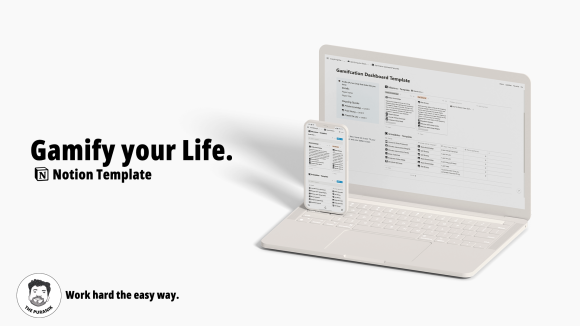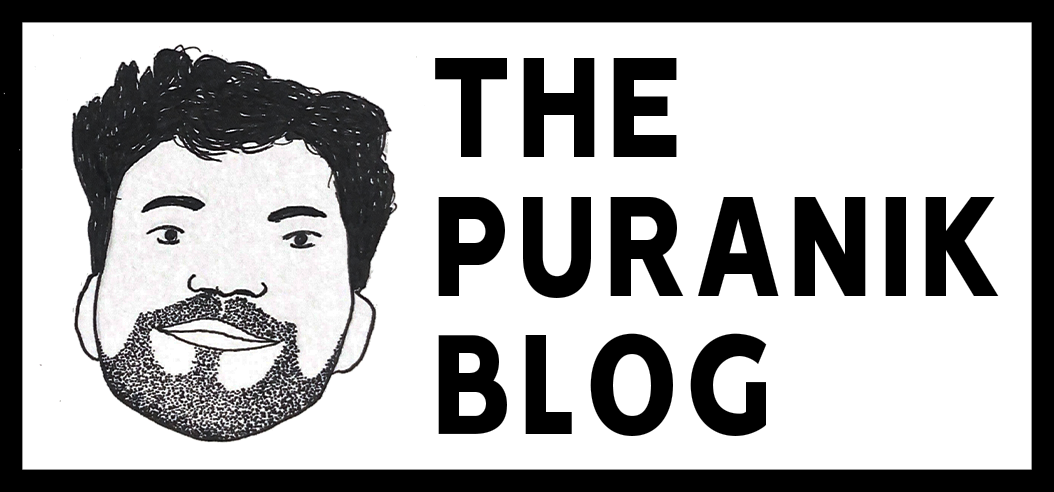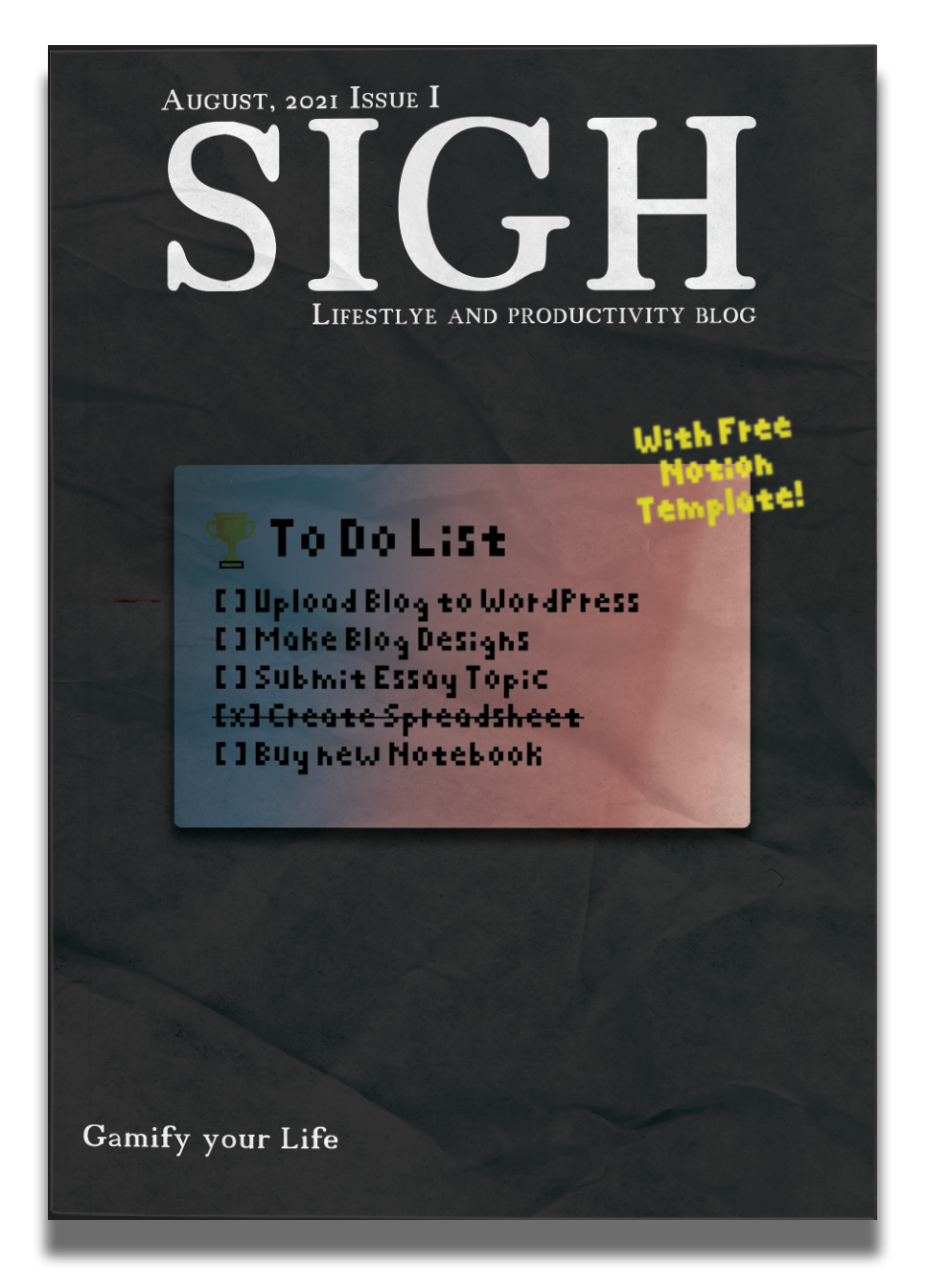Gamifying your Life is a Productivity System and Life Management system that makes you treat your goals and life in general as a Video Game, this post talks about how you can implement video game rules into your life for more productivity. There’s a notion template at the end of this post.
Video games are essentially easier versions and representations of real life.
In Video Games, the more skills you get, the more money you earn and the higher your level rises, the better your character’s experience becomes and the more capable you are. Similarly, in real life the more marketable skills you learn and the better you carry them out, the more money you earn, the better quality of life you enjoy and more doors open for you.
In the real world, learning and applying skills is more difficult and it’s more time consuming, but the rewards are much more tangible, why do people devote huge portions of their lives to Video Games then? One of the obvious reasons is that it’s more fun, but another one is that it’s way more simpler to achieve something in a video game, here’s why:
Why it’s easier to achieve in Video Games
Video Games give you a clear route to success
- The tasks you need to complete in order to finish the game are always visible
- Deviation from the path isn’t really possible
- Steps to success are clearly laid out
- A lot of the times the rewards are laid out too, making it easier to motivate yourself to do them.
The Difficulty level of video games is much lesser in each and every aspect
- There’s little to no physical effort required
- The mental commitment and persistence required from your end is extremely small
- The amount of effort you need to put in in order to do something of consequence is extreamly less (You can get a wife in 15 minutes in Sims)
- By repeating certain simple actions, you can improve your progress in a massive way.
The Risk in Video Games is much lesser
- To open a successful restaurant in Real Life, you need to risk capital investment, sacrifice time that could be used somewhere else, you risk the time and livelihood of the employees you hire
- In Video Games you risk putting pepperoni on the wrong slice and pissing off a 15 year old.
- The path has no uncertainty when it comes to video games. You either win or you lose and start again, until you eventually win. Progress is basically a guarantee
Rewards and progress
- Rewards in video games are instantaneous and immensely gratifying – in the short run
- Tracking and measuring your progress is incredibly easy in Video Games, the level system and the unlockables that come with it maintain a sense of achievement that motivates players to stick to the game and keep playing
- Video Game rewards do not impact your life in any tangible shape or form
- Video Game rewards make you happy but do not fulfill you in any way
If we want to make our life easier, why can’t we just implement these principles in our daily lives?
Make Real Life Goals into Quests
While we may not reduce risk to the level it is in Papa’s Pizzeria, we can adopt certain strategies to make goal achievement easier, generate intrinsic motivation and also gain more fulfilling rewards.
Set Clearer Goals
In games, whenever we get a new quest, the details of the quest get sent straight to our ‘Quest Log’. This is a menu with details about the task at hand. It usually has the following details:
- Title of the Goal
- Title of the larger Mission
- Context
- Actions required
- What to do
- Who to talk to
- What to watch out for
- How many times to do it
- Potential or actual rewards
This Quest Log is available at all times and helps guide us along the way. It also helps us understand what’s at stake when we embark on a quest. There is a cost of failure (even though it is not real) that motivates us to succeed, and therefore there is an emotional force behind the quest.
To create a quest log for real life goals:
- Write down what you need to achieve, (Eg. Write a book)
- Write down the steps you need to walk to achieve it (Eg. Read and Write Consistently)
- Give it sufficient context to invoke an emotion and also tell you what’s at stake. (This is a lifelong dream, etc)
- Write down the rewards (The completion of the task is an achievement in itself, the feeling of growing and making something from start to finish)
- Rewards do not have to be tangible, they can be abstract, as long as they invoke an emotion and tell you what you’re missing out on. (In How to Level Up in Life (like an RPG Video Game), Captain Sinbad recommends setting up a vision board in order to evoke emotions well.)
Reduce Difficulty
You can reduce difficulty by:
- Delegating tasks and goals to friends, family, co workers and even paid professionals
- Setting up an automation to reduce the time and energy spent on repetitive and monotonous tasks
- Setting clear goals and instructions to reduce the chances of Procrastination and boredom.
Set ‘Grindable’ Goals:
If you want to progress quickly in Video Games, you can repeat similar activities over and over again in order to improve your character’s statistics and more. Fitness Coach Michelle Segar uses a strategy to motivate exercise: Creating satisfying, repeatable experiences with sports. She helps her clients find an activity that they like and lets their preference form the motivation of that exercise, instead of some extrinsic reward like a cake or something. You can apply this to your life too. If your goal is to write a book, then break that goal into smaller ‘grindable’ actions that you can do everyday i.e., write 100 words a day, even though that’s low, it’s much more than 0.
Decide what grinding looks like
Grinding means repeating a particular act again several times to achieve a goal or qualification. So your ‘grindable’ should be an action that can be repeated and measured by the number of times it’s repeated.
If the goal is to earn more money the 2 ways to grind are to count the 1) Focused work at a desk 2) Focused work in the field
Set up a way to clearly track progress
Video Games have Levels, point systems, leader boards, and more. Try to devise a system that helps you track progress of your own goals and achievements. Consider attaching points to each grindable activity, like 10 points for every 100 words you write and then set levels that are progressively difficult to surpass. For example, Level 1 is 0 – 10 Points, Level 2 is 10 – 25 Points and so on and so forth.
The level system can also work through milestones. For example, if you’re learning how to cook, then you can select a few dishes that are progressively difficult to nail – each dish representing a different level.
You should also consider keeping a journal to keep track on your grindables, quests and also maintain a repository of your past progress An important thing to note here is that unlike Video Games, skills that go unpracticed will deteriorate over time. Consider setting a level down mechanism as well to maintain accurate statistics. You could deduct a fixed number of points for every time you don’t practice the skill for a week or month, etc.
Resistance as a power up
In his stellar video Joey from Better Ideas talks about using resistance and hesitancy as a power up to deal with difficult quests and goals that cannot be simplified. Just like how more difficult monsters drop better items in games, more difficult goals, give greater levels of satisfaction when completed.
Difficult goals are often blocked by resistance, i.e. the internal feeling of hesitancy and constraint that holds us back from doing things. It comes from fear, uncertainty and difficulty. Overcoming resistance unlocks a ton of satisfaction and is empowering, irrespective of the outcome. Even if you surpass resistance and the outcome is undesirable, you still overcame the difficulty.
When you overcome resistance, you absorb it’s power, and the greater the resistance , the greater the power
Reflect on rewards
Think about and appreciate your rewards on a regular basis. Rewards you get from Video Games are satisfying in the short run, but if you think about it, those rewards are short term and don’t lead to any long term fulfillment. Appreciating and assessing the value of rewards helps you set stronger rewards in the future, and also prioritize goals and activities in the future.
Conclusion
While gamifying your life may not revolutionize the way you work and progress in life, it is definitely a meticulously designed and perfected system of goal and task management. If you don’t want to gamify your life fully, consider the organisation of goals and tasks in a way that mimics how video games do it.
If you’re interested in Gamifying your life, then you may want to look into my Notion Template for the same. I made this a few weeks ago to experiment with the concept of gamifying my life and it’s been working well. Get the Template by clicking on the image below.

I hope this post brought you value and helped you in some way, share your take-aways and experiments with this idea in the comments below. If you think this post deserves more attention then please consider sharing it with your friends and subscribing to this blog. Next post in two weeks. Have a great day!

